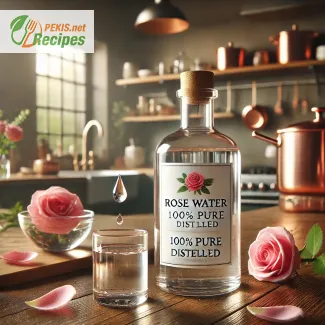
Rose Water: A Comprehensive Guide to Its Benefits, Uses, and Production
What is Rose Water?
Rose water is a fragrant liquid made by distilling rose petals with steam. It has been used for centuries in cosmetics, medicine, and culinary applications. The delicate and refreshing essence of rose water has made it a staple in many cultures around the world. It is especially popular in Middle Eastern, South Asian, and Mediterranean cuisines, where it is used to enhance the flavor of dishes and beverages. Beyond its culinary appeal, rose water is widely utilized for its therapeutic and skin-enhancing properties.
The History and Cultural Significance of Rose Water
Rose water has an ancient history that dates back thousands of years. The earliest recorded use of rose water can be traced to Persia (modern-day Iran), where it was developed as a byproduct of the rose oil distillation process. It was highly prized in the ancient Roman, Greek, and Egyptian civilizations for its medicinal properties, beauty applications, and religious ceremonies.
In the Middle Ages, rose water was a valuable commodity in the Islamic world, where it was used in perfumes, cooking, and medicine. The tradition of using rose water spread across Europe during the Crusades, influencing European perfumery and culinary arts. Today, it remains an essential ingredient in various global traditions, including Ayurveda, traditional Persian medicine, and modern aromatherapy.
How Rose Water is Made
There are several methods of making rose water, each varying in complexity and quality. The most common methods include:
1. Steam Distillation
This is the highest-quality method used for making pure rose water. The process involves:
- Harvesting fresh rose petals, typically from Rosa damascena (Damask rose) or Rosa centifolia.
- Placing the petals in a distillation apparatus.
- Passing steam through the petals, which extracts essential oils and aromatic compounds.
- Condensing the steam back into a liquid form to obtain rose water.
2. Boiling Method
A simpler method used in home preparations, which involves:
- Boiling fresh rose petals in water.
- Straining the liquid to remove the petals.
- Storing the fragrant infusion in an airtight container.
3. Infusion Method
This method is less potent but still effective for homemade rose water:
- Soaking fresh petals in distilled water for several hours.
- Gently heating the water to enhance extraction.
- Filtering and storing the liquid.
Chemical Composition and Nutritional Profile
Rose water contains vitamins, antioxidants, and essential compounds that contribute to its therapeutic and cosmetic benefits. Some key components include:
- Flavonoids – Natural antioxidants that help protect skin from oxidative stress.
- Phenolic compounds – Have antimicrobial and anti-inflammatory properties.
- Vitamin C – Helps in skin repair and collagen production.
- Geraniol & Citronellol – Natural components that provide a pleasant fragrance and contribute to antimicrobial properties.
Health Benefits of Rose Water
Rose water is well-known for its numerous health and beauty benefits. Some of the major benefits include:
1. Skin Care Benefits
- Hydrates and Soothes Skin – Rose water is an excellent natural moisturizer that refreshes and hydrates dry skin.
- Reduces Inflammation – The anti-inflammatory properties help soothe irritated skin, acne, and sunburns.
- Anti-Aging Effects – Antioxidants in rose water fight free radicals, reducing fine lines and wrinkles.
- Balances pH Levels – Helps in maintaining skin’s natural pH balance, reducing excess oil production.
2. Hair Care Benefits
- Strengthens Hair – Rose water promotes healthy scalp conditions and strengthens hair roots.
- Reduces Dandruff – Its antifungal and antibacterial properties help combat scalp infections and dandruff.
- Adds Shine and Fragrance – When used as a hair rinse, rose water adds shine and a pleasant aroma.
3. Medicinal and Therapeutic Benefits
- Aids Digestion – Rose water helps in reducing bloating and indigestion.
- Reduces Stress and Anxiety – The calming aroma of rose water has natural anti-anxiety and antidepressant effects.
- Relieves Sore Throat – Used as a gargle, it helps soothe a sore throat due to its antibacterial properties.
- Promotes Eye Health – Rose water can be used as an eye rinse to reduce eye redness and irritation.
Culinary Uses of Rose Water
Rose water is widely used in desserts, beverages, and savory dishes. Some common culinary applications include:
- Middle Eastern & South Asian Desserts – Used in baklava, gulab jamun, Turkish delight, and rice puddings.
- Beverages – Added to lemonades, cocktails, and herbal teas for an aromatic touch.
- Salad Dressings & Marinades – Enhances the flavor of fruit salads, yogurt-based dressings, and marinades.
How to Use Rose Water in Your Daily Routine
Rose water can be incorporated into daily routines in multiple ways:
- As a Facial Toner – Spray onto the face to refresh and tone skin.
- In Homemade Face Masks – Mix with clay or honey for a hydrating mask.
- In Aromatherapy – Add to a diffuser or bath for relaxation.
- As a Natural Perfume – Used as a body mist for a light, floral scent.
How to Make Rose Water at Home
To make pure rose water at home, follow this simple steam distillation method:
- Gather fresh rose petals from pesticide-free roses.
- Place petals in a large pot and cover with distilled water.
- Simmer on low heat for about 30 minutes until the petals lose their color.
- Strain the liquid and store it in a clean glass bottle.
Storage and Shelf Life
To prolong freshness, store rose water in a dark glass bottle in the refrigerator. Properly stored, it can last for up to six months.
Rose water is a versatile, natural product with countless benefits. From skin care and hair health to culinary and medicinal applications, it remains a timeless elixir of beauty and wellness. Whether you purchase high-quality distilled rose water or make it at home, incorporating this fragrant floral water into your routine can enhance your well-being and daily rituals.